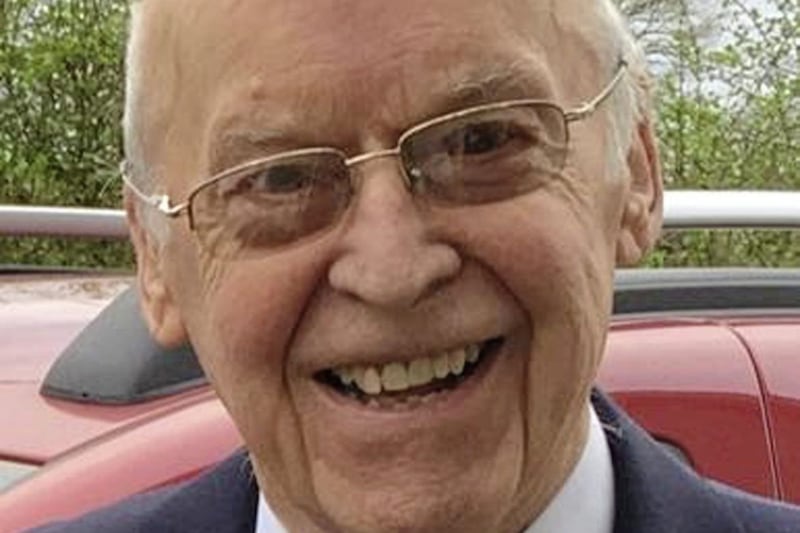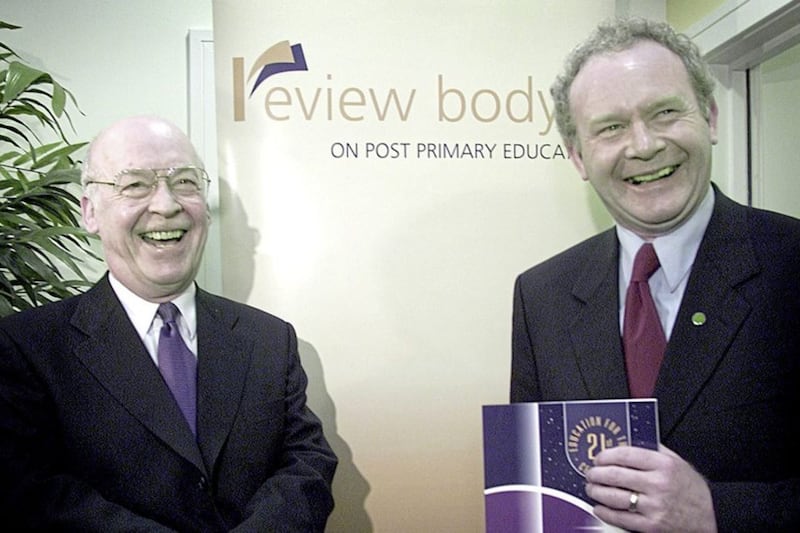
Gerry Burns with education minister Martin McGuinness after publication of the 'Burns Report' on the future of post-primary education
GERRY Burns had a deep commitment to public service powered by a relentless drive to challenge and improve himself.
As chief executive of Fermanagh District Council the Falls Road man worked tirelessly for his adopted home, always with a new project on the go or an idea to bring people together.
He played a vital leadership role in the dark days and months after the horror of the Enniskillen bomb when the community risked being ripped apart.
Gerry had narrowly avoided death himself when the IRA bomb exploded at the town's war memorial in November 1987.
Had he not been running late he would have been standing in the spot where Gordon Wilson and his daughter Marie were buried in rubble, fatally injuring the 20-year-old woman.
He returned home that day with only glass and stones in his hair but with a determination to play his part in helping the town recover.
Along with Mr Wilson, whose words of forgiveness and reconciliation would echo around the world, he became a founding member of the Spirit of Enniskillen Trust which worked with young people to encourage cross-community dialogue.
In what passed for retirement Gerry filled his time with further public service roles, from standing up for citizens' rights as NI Ombudsman to chairing the 'Burns Report' on reform of the 11-plus and post-primary education.
He was also a wonderful husband and father and in later years a devoted carer to his wife, an example to the end of the values of love, tolerance and selflessness.
Gerry's constant drive for self-improvement could perhaps be traced to his upbringing in Milford Street in west Belfast, when he suffered the loss of his father Bernard aged four.
He was the second last of six children and his mother Sarah had to work several jobs to make ends meet, instilling at an early age the value of money and hard work.

Gerry graduated with a degree in economics
After education at St Mary's CBS he worked in office jobs including in Weights and Measures.
However, his eyes were always on the horizon and he decided to return part-time to education, enrolling on a degree course in economics at Queen's University.
By this time he had met and married Maire (Moyra) Connolly, a Glenswoman training as a nurse in the Mater Hospital.
Fr Raymond Donnelly told his funeral: "It was love at first sight, despite Gerry turning up on a scooter for their first date."

Gerry Burns with his wife Moyra
After graduating, they moved to Armagh where Gerry took up a lecturing post at the technical college.
He greatly enjoyed the work, but when an advertisement was published for a new chief executive of Fermanagh council he decided to risk another change of career.
His was the most unlikely of appointments - not only the first Catholic to hold the post, but an outsider all the way from the Falls Road - and there was inevitably some opposition.
However, once in the role Gerry set about changing minds and his openness, sincerity and even-handedness quickly won him friends.
Having relocated to Enniskillen, he became a familiar face around the town, happy to stop with anyone for a chat.
Over the next two decades he proudly presided over a succession of major projects, from restoring the Town Hall and Buttermarket to the opening of the Ardhowen Theatre, the Erneside Shopping Centre, the Marble Arch Caves and Nearne Equestrian Centre.
After retiring in 1996 he was appointed NI Ombudsman, seeking to ensure accountability in public services on behalf of ordinary citizens.

Gerry Burns served as the NI Ombudsman after his retirement from Fermanagh District Council
In 2001 he was asked to chair the Review Body on Post-Primary Education, which proposed a radical plan to abolish the 11-plus system of academic selection in favour of parents making informed choices of schools working together in 'collegiate' networks.
The exercise was remarkable in securing unanimous agreement on a hotly-contested issue from a team of educationalists and business people representing all shades of opinion.

Gerry Burns at the launch of the Review of Post-Primary Education
However, it would always be a source of personal regret that its message of equality of opportunity for every child would become lost in a zero-sum debate about grammar schools, with the transfer system remaining largely unreformed to this day.
Gerry also served on the NI Tourist Board, the BBC General Advisory Council, The Irish Times Board, the Heritage Lottery Fund, and as Pro Chancellor of the University of Ulster.
He was recognised with an MBE and honorary doctorates from both Queen's and UU, although he was typically too modest to use the titles.

Gerry received honorary degrees from both the University of Ulster and Queen's University
In what limited spare time he had, Gerry loved watching rugby.
He and Moyra also enjoyed travelling together and he was a doting grandfather.
Son John told his funeral at St Michael's Church, Enniskillen that he was always there to guide and support his family.
"He was a very warm, caring man, respected, admired and loved. He was my best friend," he said.
"In later years he was devoted to the care of our mother. He called her his 'wee star' and always thought she was too good for him. She'd always tell him 'catch yourself on'. Their love never faded."
He added: "He always set an example of how to love and care. He was the anchor for our family and he had a positive impact on everyone he met. If I am half the man he was I'd be very happy."
Gerry Burns died aged 85 on February 18. Predeceased a year ago by his wife, he is survived by his children Gerry, Declan, Yvanna, Nuala and John, and his sister Una.
His month's mind will be celebrated on May 2 at 6pm.



